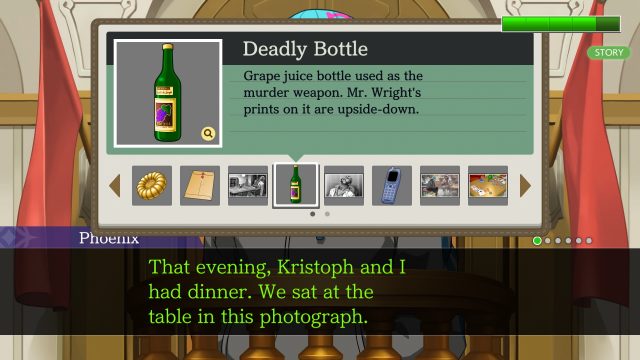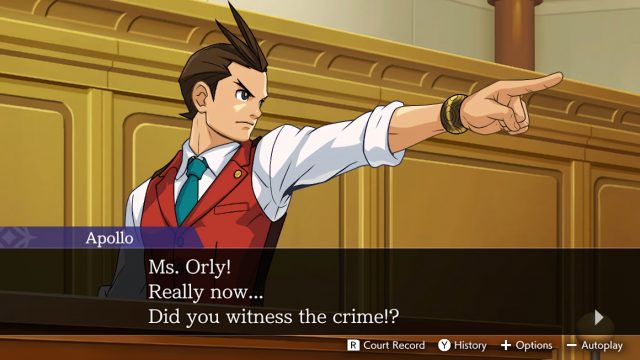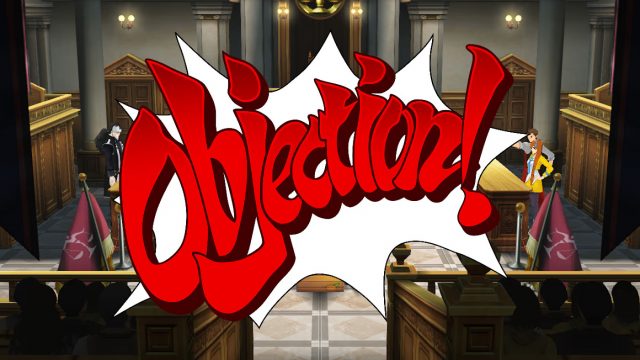Spectacular remaster makes these games look better than ever; excellent sound design filled with memorable chimes and tones; delightful soundtrack; solid stories will keep most players guessing until the end; stuffed with hours of content that will keep players hooked
Trigger warning is an insult; navigation in the game world remains clunky; some inconsistencies in logic during trials; legacy DC touch screen gameplay segments aren't quite as intuitive via traditional controls or even the Switch touch screen
The Ace Attorney series is one of the reasons why Nintendo DS is my favorite video game console. When DS came out I was a freshman in college and just starting to spread my wings as a gamer. I’d never played a visual novel game in my life until Phoenix Wright: Ace Attorney. A classmate at school was the first person to make me aware of the series when he told me he was importing a “lawyer game” from Japan that he was going to play. When it was finally localized into English in 2005 I picked up a copy and couldn’t stop playing it from the moment I started.
Once Apollo Justice: Ace Attorney hit DS in 2008 the Ace Attorney brand was an established hit, but it would be the final installment in the mainline series to get a physical launch in the west. The final two modern day incarnations of Ace Attorney would head to Nintendo 3DS via the eShop, with Phoenix Wright: Ace Attorney – Dual Destinies dropping in 2013 and Phoenix Wright: Ace Attorney – Spirit of Justice in 2016. This latter trilogy of the Ace Attorney series is every bit as wonderful as the earlier one, but with the closure of the 3DS eShop last year and the relative age of Nintendo DS making it harder and harder to play games on that system, getting a hold of all three games had become a challenge—until now.
With the launch of Apollo Justice: Ace Attorney Trilogy, Capcom has now brought the entire mainline series to Nintendo Switch. This collection brings with it the aforementioned Apollo Justice: Ace Attorney, Phoenix Wright – Dual Destinies, and Phoenix Wright – Spirit of Justice, all with revamped visuals, remastered audio, and a bevy of extras. With the exception of some changes to the controls, this version of the three games is the definitive take on the trio and well worth a play from returning fans and those who never got to experience them in the first place.
To start, let’s look at presentation. The first game of the set, Apollo Justice, harkens back to the hand-drawn style utilized in Phoenix Wright: Ace Attorney Trilogy, which redid all the sprites from the original DS games. The other two games here, Dual Destinies and Spirit of Vengeance, were 3DS released rendered in polygons, which have been given a fresh HD sheen for the Apollo Trilogy. I adored the original pixel font from the DS games and the 3DS font was inoffensive, but the serif font that Capcom chose for this set of remasters is sublime, really meshing with the feel of the series. It might not seem like much, but the wrong font can make a big difference—look no further than Ocarina of Time 3D and Majora’s Mask 3D, which used bland sans-serif fonts much to their detriment.
The music remains a highlight of this series, with some incredibly catchy tunes to listen to in each game. The pleasing sound of the text scroll is also welcome as ever, along with the satisfying input chimes sprinkled throughout. In visual novels the interface is going to be the backbone of the experience as much as the narrative, and this is an area where the Ace Attorney games have always delivered (and excelled). Throw in some iconic phrases like “Objection!” and “Take That!” and the Ace Attorney series remains one of the most clever when it comes to use of sound and music.
Story is where player mileage will vary for players. Not because the stories are bad, but rather because the stories can be quite… colorful. Outlandish. Insane. Well, let me scale that back a tad and say over-the-top. Which, for me, is why I have so much fun playing these games. There are tons of twists, many of which will leave even the biggest sleuths surprised by. At the same time, some of the conceits of any given case can feel a little contrived or cheap. Plot armor, as critics call it, where characters and scenarios magically come together for no other reason than to allow the story to unfold in a way most convenient for the writer. I’m looking at you, Apollo, and your ridiculous eyepatch.
Still, the outlandish is sort of what makes Ace Attorney the series that it is. At one point players find themselves defending a whale, for crying out loud, and honestly within the framework of this game world it manages to work. The same can be said of the different abilities that numerous characters have to help them perceive “tells” in people at the stand or to solve riddles during investigations. Apollo’s ability to perceive and Athena’s robotic aid assist to break up any monotony that might set in during trials, as well, acting as minigames to keep things fresh. Likewise, the investigation portions of the Ace Attorney series are another welcome break in the action, giving players a chance to explore, connect with other characters, and poke around the environment to look for clues.
Although these three games were originally designed with the dual screen, touch control setups of DS and 3DS in mind, the transition to a single, touch-less screen is almost flawless. There are some exceptions to this, like sequences where the chemical luminol must be sprayed in order to reveal blood spatter, which were more intuitive and entertaining when using a stylus for control. However, these segments of gameplay are still serviceable via the right control stick and button presses. It’s notable that on Switch it’s still possible to use touch controls, although the interface isn’t anywhere near as elegant nor precise as it was on DS or 3DS.
As solid of a job as Capcom has done in transitioning this trio of games from DS and 3DS to Switch, there remain some quality of life issues all the same. For one thing, traversal during the investigation portion of each game can become a bit tedious. It isn’t always clear when an area has been exhausted of clues or required character interactions, which can mean a lot of bouncing back and forth trying to figure out what was missed or unfinished. Thankfully, when hovering the cursor over the environment for clues, the game will signal to the player that an object is searchable, as well as whether or not it has already been examined. This definitely helps, but even with this feature, traveling around the game world could stand to be a bit smoother.
Also, as the series can be somewhat infamous for, there are times when the logic behind the presentation of certain evidence or facts during trials can be questionable at best. Players will have glommed on to what is clearly a sensible connection only to be rebuffed by the game, leaving them confused. It isn’t so often an occurrence that it’s a glaring problem, but it might have been an opportunity with this collection to amend some of these inconsistencies. Alas, Capcom chose not to. At least the History button allows players to comb through previous dialogue, a much appreciated addition that I wish could be patched into the Phoenix Wright Trilogy.
If I have one major gripe, it arrives almost the second the Apollo Justice Trilogy powers on: a trigger warning about the game’s content. I am thankful the game hasn’t been censored, but I find this sort of label massively problematic and insulting to players. It’s a precautionary shield against Internet criticism that I balk at every time I see it. Games are art; imagine how ludicrous it would be to walk into the Accademia Gallery of Florence to look at the David, only to have big signs up as you approach saying, “warning, nude statue might offend some people.” I don’t like catering to the whims of online mobs and that’s what this reeks of. Ace Attorney games need no cautionary signage for the perpetually offended.
That said, let’s wrap on a positive note, which is that the collection’s extras are very well done. Orchestra Hall provides a whole menagerie of tunes to enjoy, and, as the name suggests, there are even symphonic versions of some of the songs. The Art Library, meanwhile, plays host to tons of development materials, promotional art, and even the Spirit of Justice Prologue anime. Yes, there’s an entire short film stuffed in here for players to watch. Finally, for those who want to make their own Ace Attorney scenes, there’s an Animation Studio where models of the characters can be posed and manipulated. It’s quite a lot to engage with on top of the wealth of content the games alone provide.
My love of this series remains as strong as ever almost 20 years after playing the original Ace Attorney game. Being able to have the entire mainline series on Switch is such an amazing thing to have. The three games in Apollo Justice: Ace Attorney Trilogy are strong. Although admittedly Dual Destinies suffers from its split focus on a trio of protagonists, there isn’t a truly weak game in the bunch. With solid quality of life improvements, a faithful retelling of the original stories, and the same engrossing, thoughtful gameplay the series is known for, this compilation is a genuine delight. Some of the negative design quirks of the originals remain, like clunky world navigation, but the positives of the Ace Attorney series far outweigh them. This is a must for fans of narrative-driven games who want a more cerebral experience.
Nintendojo was provided a copy of this game for review by a third party, though that does not affect our recommendation. For every review, Nintendojo uses a standard criteria.




 ShareThis
ShareThis








